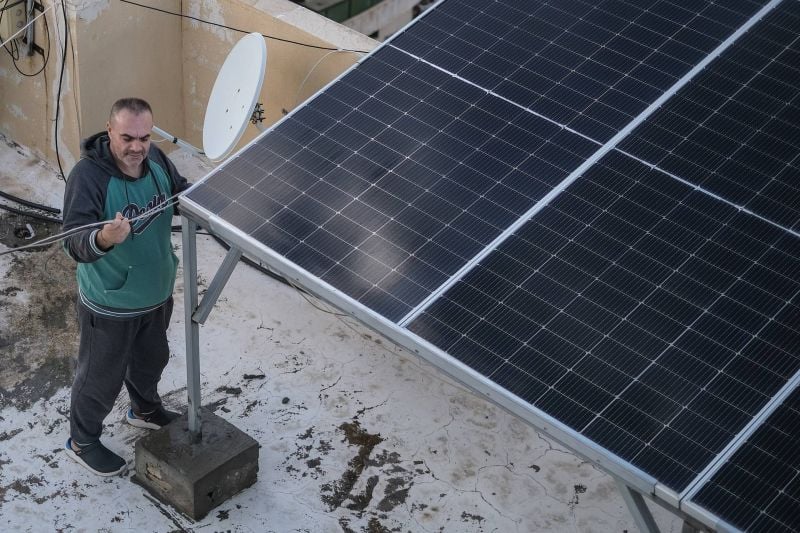
Wael Wattar attends to his solar panels set up on the rooftop of his building, Jan. 14, 2024. (Credit: João Sousa/L'Orient Today)
BEIRUT — Her husband said no. But Fadwa Naseef went ahead anyway — while Suleiman was at work one day, she pawned her two gold wedding rings to a lending institution to borrow money for a solar power system. Her hope: to put the lights back on for her family after years of diminishing electricity.
Such jewelry, traditionally given by the groom to his bride upon marriage, is an asset exclusively meant for women — and not intended for sale except in desperate situations. There was no turning back.
“Then, I went by myself to the company that installs solar power and brought them to our house,” Naseef says, in Beirut’s southern suburbs.
The 50-year-old homemaker cannot work as she needs to take care of her husband’s ailing father. Before deciding to buy solar panels almost a year ago, Naseef and her husband were sharing a five-ampere backup generator subscription with her brother, who is also her neighbor. Each household was paying $50.
The widespread use of solar panels in electricity-deprived Lebanon is largely thought to be confined to wealthy households that still afford to shoulder the burden the country reels from a multi-year economic crisis.
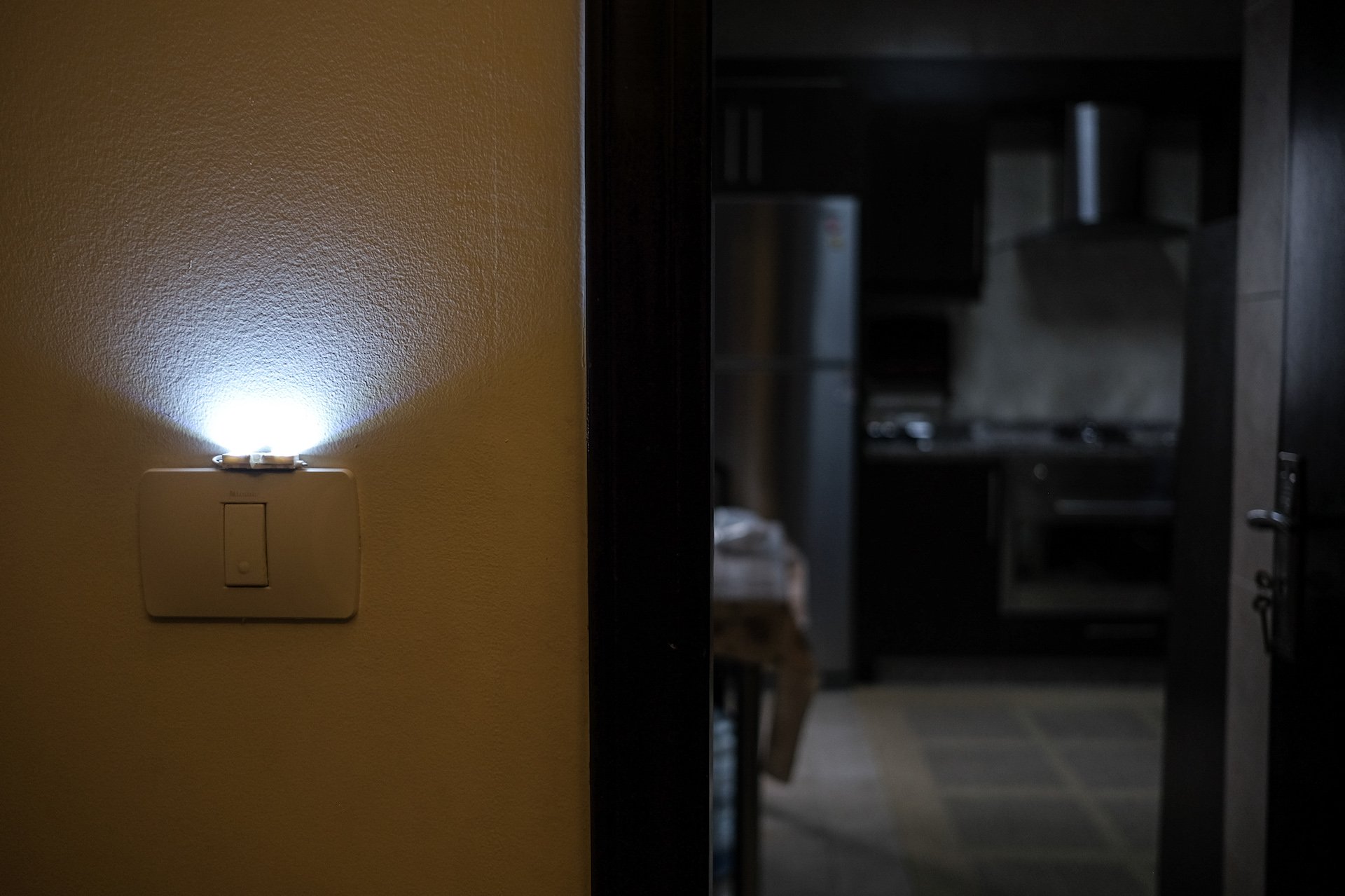 A picture shows a tiny lamp attached to a power switch and powered by a computer UPS in Wael Wattar’s house, Jan. 14, 2024. (Credit: João Sousa/L'Orient Today)
A picture shows a tiny lamp attached to a power switch and powered by a computer UPS in Wael Wattar’s house, Jan. 14, 2024. (Credit: João Sousa/L'Orient Today)
But low-income families have been buying photovoltaic (PV) solar power systems too, often selling their belongings or borrowing money to secure a basic necessity — electricity.
Despite bidding farewell to her gold rings, Naseef says she is “proud” she was able to help her family.
She’s not alone. For Zeinab Khaled, the decision to sell her own marriage jewelry was not taken lightly. “We had no other solution,” Khaled tells L’Orient Today from her home in Noueiri, Beirut, where she lives with her three teenage children.
“The dilemma lay between “do I keep it, I mean it was just lying there… or do I use it and ease our hardship? I wanted to do this for my family.”
With the money from her jewelry, Khaled bought a six-panel solar energy system worth about $3,500, which now provides the family with five amperes of power.
Keeping the lights on
Lebanese authorities have failed for decades to properly manage the state-run electricity company, Électricité du Liban (EDL). It currently provides only a handful of hours of power per day, severely impacting daily life, businesses and essential services.
Finding an alternative to the state-provided power is difficult for families with limited income. For years, households have been heavily reliant on privately run backup generators.
But, the subscription fee spiked to unaffordable levels as the hours of power supply dwindled.
The gap has become worse since 2019 as Lebanon spiraled into an economic crisis of historic proportions.
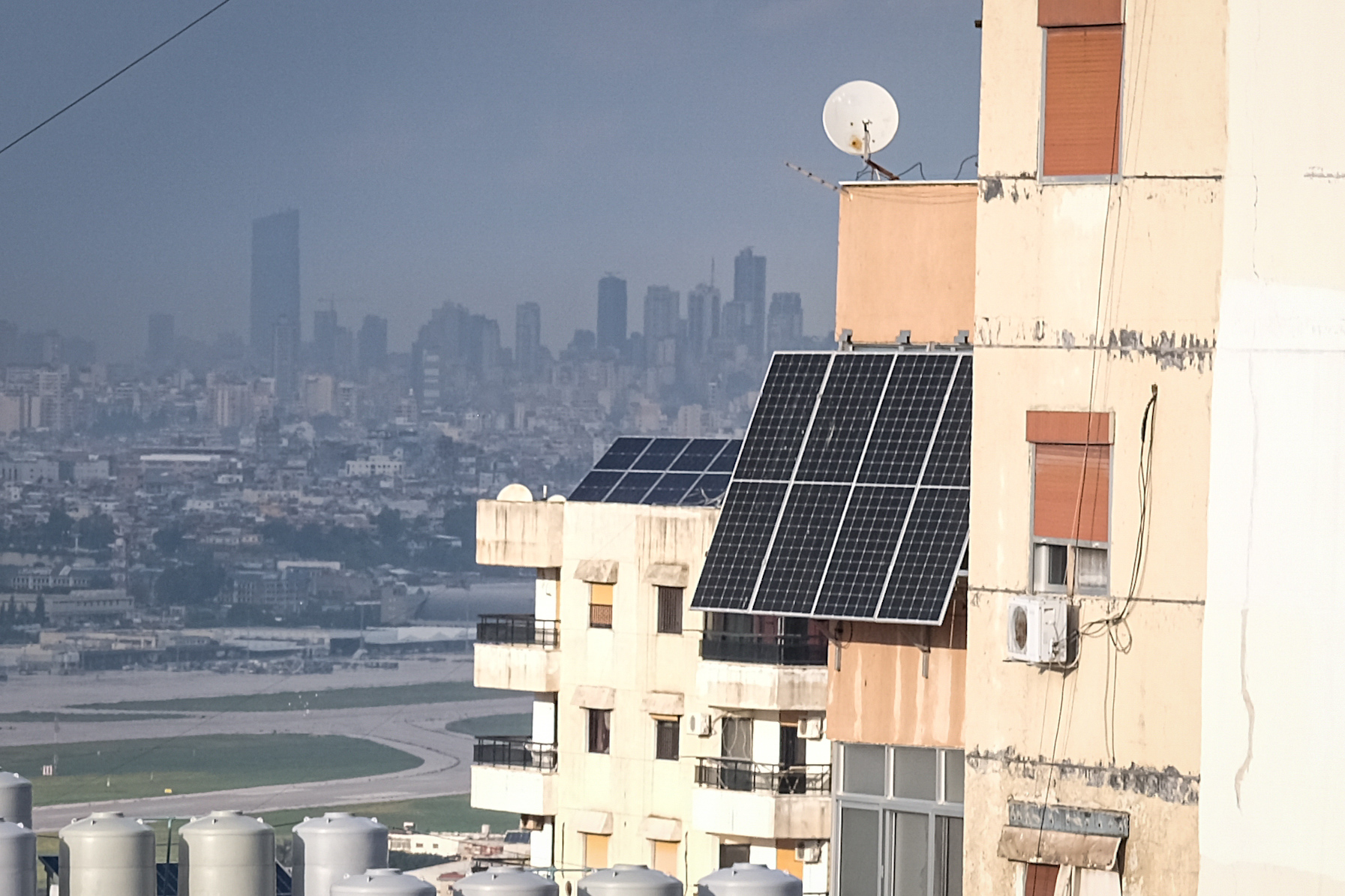 Desperate household sets up six solar panels on its balcony instead of the building’s inaccessible-to-all rooftop, Jan. 14, 2024. (Credit: João Sousa/L'Orient Today)
Desperate household sets up six solar panels on its balcony instead of the building’s inaccessible-to-all rooftop, Jan. 14, 2024. (Credit: João Sousa/L'Orient Today)
Among the poorest 20 percent of households, one in five lack access to a generator, while among the wealthiest 20 percent of households, only one in 50 faced this issue, according to a 2023 report by Human Rights Watch.
The predominant reason they cited for not having a generator subscription: financial constraints.
All of his life savings
Wael Wattar owns a carwash business in Beirut but lives in Aramoun, around 15 kilometers southeast of Beirut.
Paying $150 per month to his building’s generator owner for as little as five amperes of power was bad enough, but then the owner began gradually diminishing the hours of generator power supply. That was the final straw for Wattar.
He decided two years ago to spend all of his life savings, and cancel his two young daughters’ health insurance and his car insurance, to purchase eight solar panels with four acid batteries, costing him $4,000.
“We used to rely on our savings when we fell a little short,” Wattar says. “Now, we spend only what we earn. We are left with no backup money.”
However, adopting solar energy came with many upsides.
“Instead of seven hours of power, now we have almost 24 … and instead of five amperes, now we have 16,” he says.
Halima, Wattar’s wife, adds that they now also have consistent internet connection. Before, they used to spend much of their income on 3G top-up cards. “It made a big difference because our kids’ school system relies heavily on the internet — all of their assignments and lessons are sent via an application on the phone.”
Does adopting solar energy actually reduce households’ average monthly electricity expenses? According to Rony Karam, president of the Lebanese Foundation For Renewable Energy, “It is a no brainer.”
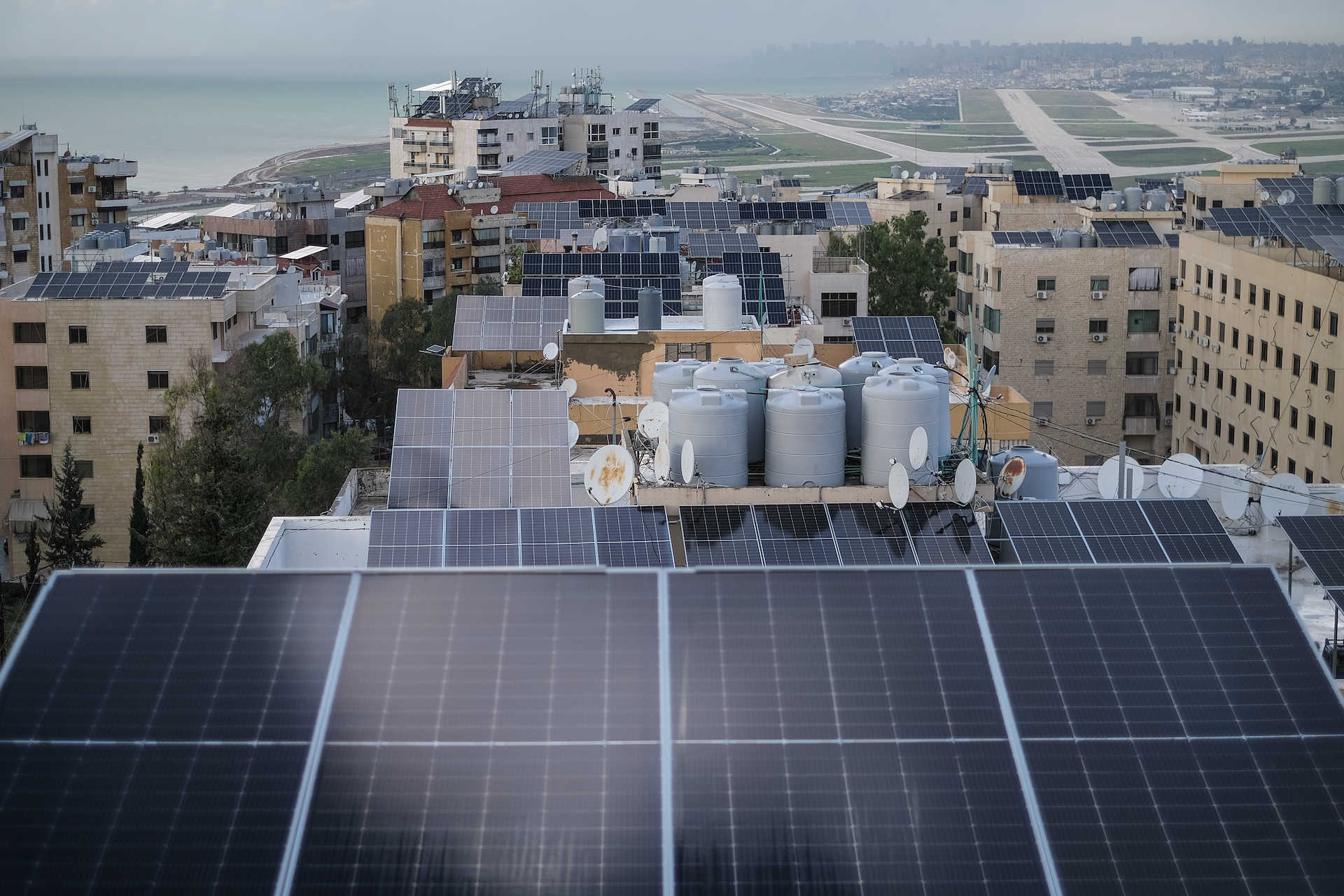 Solar panels set up on rooftops overlooking Beirut International Airport in Aramoun, south of Beirut, Jan. 14, 2024. (Credit: João Sousa/L'Orient Today)
Solar panels set up on rooftops overlooking Beirut International Airport in Aramoun, south of Beirut, Jan. 14, 2024. (Credit: João Sousa/L'Orient Today)
“Solar energy costs five times less than normal electricity,” Karam says.
He adds that people adopting solar energy typically get back their money in two to three years on average. Good quality systems — solar panels and inverters —last up to 25 years, while the batteries range from three to 10 years, depending on the type.
Family remittances and debt
That math means solar panels are becoming a household necessity.
Wissam Daou is an engineer and founder of Dawtec, a company in Baabda that imports, sells and installs solar panel systems. He tells L’Orient Today that though sales of PV systems boomed several times over the last two decades, nothing compares to the solar boom of the past three years, when the electricity crisis, driven by the economic turmoil, kicked in across Lebanon.
Some financial institutions have been offering loans for households wishing to adopt solar energy. For instance, the Hezbollah-affiliated association, al-Qard al-Hassan, granted 20,000 loans in 2022 as part of a program to finance the installation of solar energy panels, according to previous reporting by L’Orient Today.
The association provides pawnbroker services to its customers — paying depositors for jewelry and other precious possessions, and holding them in trust until they have the cash to reclaim them.
The boom of solar panels sales “is starting to take a dip now though,” Daou notes, “because many households have already installed [solar systems].”
From his experience, Daou said that among his low-income clients, some paid for solar power systems with remittances from family members living and working abroad.
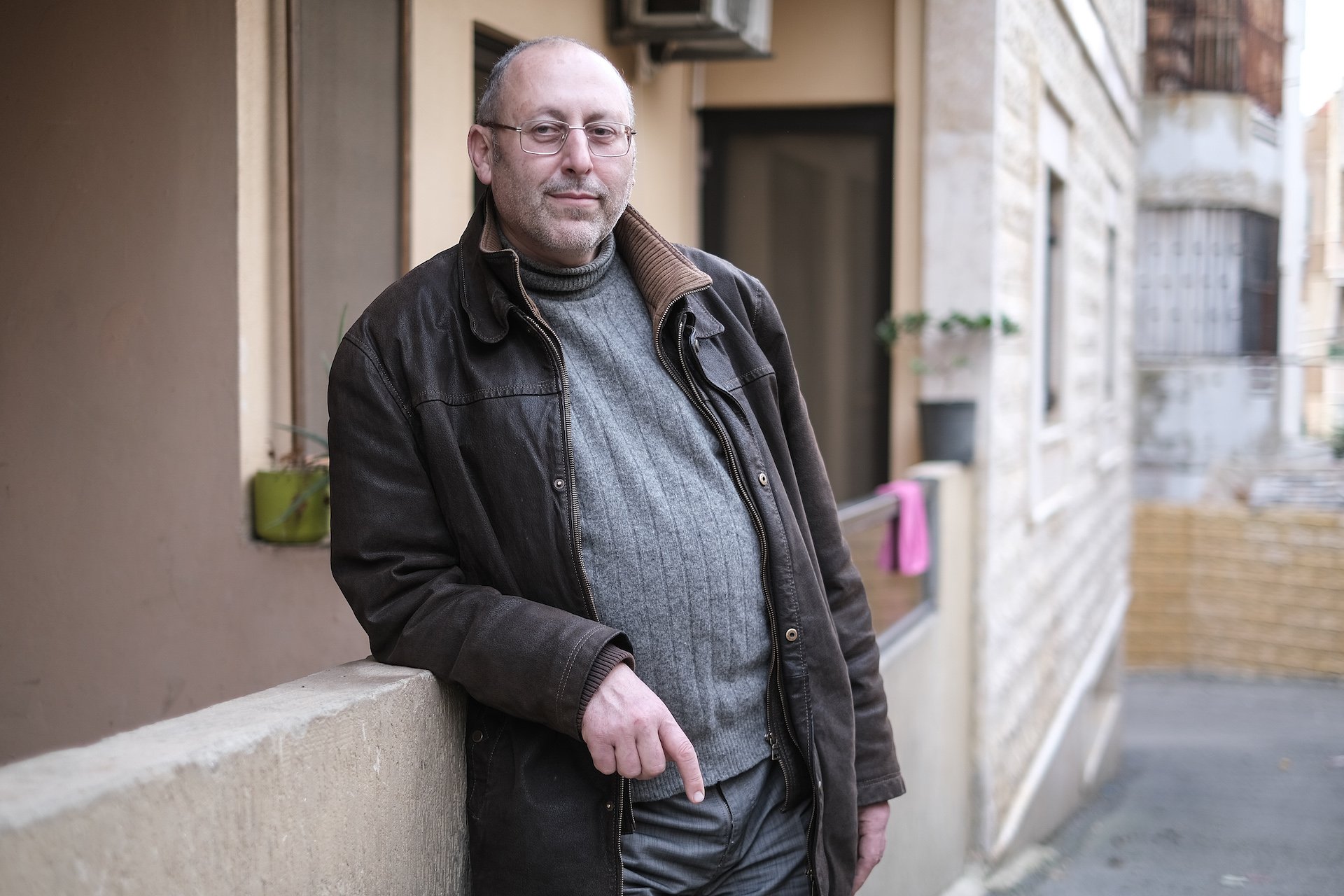 Mazen Tamim poses for a portrait in front of his building in Naameh, south of Beirut, Jan. 17, 2024. (Credit: João Sousa/L'Orient Today)
Mazen Tamim poses for a portrait in front of his building in Naameh, south of Beirut, Jan. 17, 2024. (Credit: João Sousa/L'Orient Today)
Others borrow the money they need for solar power, going into debt.
Three years ago, Mazen Tamim was in dire financial straits. He worked delivering mail while his wife, who worked as a teacher, had to leave her job due to a back surgery.
Tamim’s salary was no longer enough to cover the livelihood expenses of his four-member family on top of the steep generator bill. “My wife suggested that I borrow money from my brother and what we used to pay for the generator, we can pay it per month to resettle the loan,” says the 50-year-old, who lives in Naameh, south of Beirut.
Today, the family’s eight solar panels provide them with around 20 amperes of power instead of the five amperes they used to have from a private monthly generator subscription for $120. But, Tamim still has $1,580 to pay back his brother.
Daou says adopting solar energy will eventually pay back, reducing households’ electricity consumption and expenses, “if they installed good quality systems.”
Moreover, “people today are becoming more energy conscious and aware of the electric consumption of every single appliance and try to search for less consuming products — it is creating a good impact on people’s habits,” he adds.
Wattar says that he upgraded one of the electric parts of his water heater to one that now uses four times less energy, allowing him to turn it on using solar power. Once he saves up enough money, he also plans on upgrading his AC units to use less electricity.
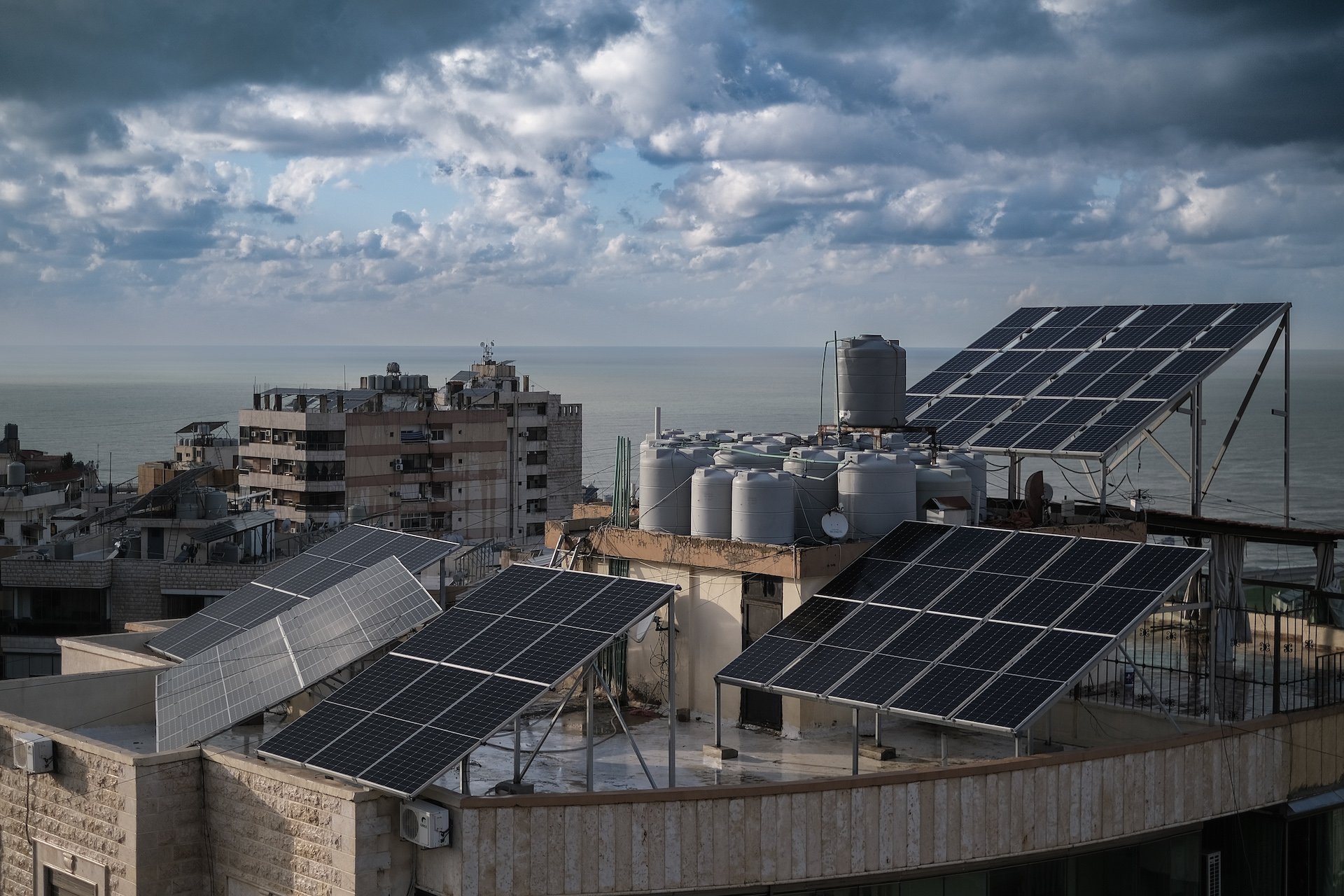 Solar panels set up on rooftops overlooking Beirut International Airport in Aramoun, south of Beirut, Jan. 14, 2024. (Credit: João Sousa/L'Orient Today)
Solar panels set up on rooftops overlooking Beirut International Airport in Aramoun, south of Beirut, Jan. 14, 2024. (Credit: João Sousa/L'Orient Today)
Bare necessity brings profound joy
Fadwa Naseef says her life has improved since pawning her wedding gold for solar panels. She looks forward to retrieving her gold rings back once she pays off the loan she got from al-Qard al-Hassan in exchange for the jewelry.
Naseef’s husband Suleiman, who works as a warehouse keeper, is slowly settling that loan by paying al-Qard al-Hassan a $45 monthly fee.
The couple have had their solar system installed for 11 months. It changed their lives, Naseef says, but “it is not enough.” They had to completely let go of their generator subscription as they can’t afford both.
“When it’s cloudy, we can only turn on the light bulbs,” she says. “I’ve had the refrigerator off for several days now.”
Despite having steady electricity now, Zeinab Khaled also turns off the refrigerator during periods of low sunlight and waits for the state power to do the laundry and turn on the water heater.
“Though, thank God that in Lebanon, we have sun even in the winter,” she laughs.
Almost a year after adopting solar energy for electricity and ending her generator subscription, she says she and her family experienced an 80 percent increase in the number of hours of electricity.
“I can switch the lights on whenever I come back home now!” she gushes. It’s a basic upgrade that nevertheless fills her with profound joy.